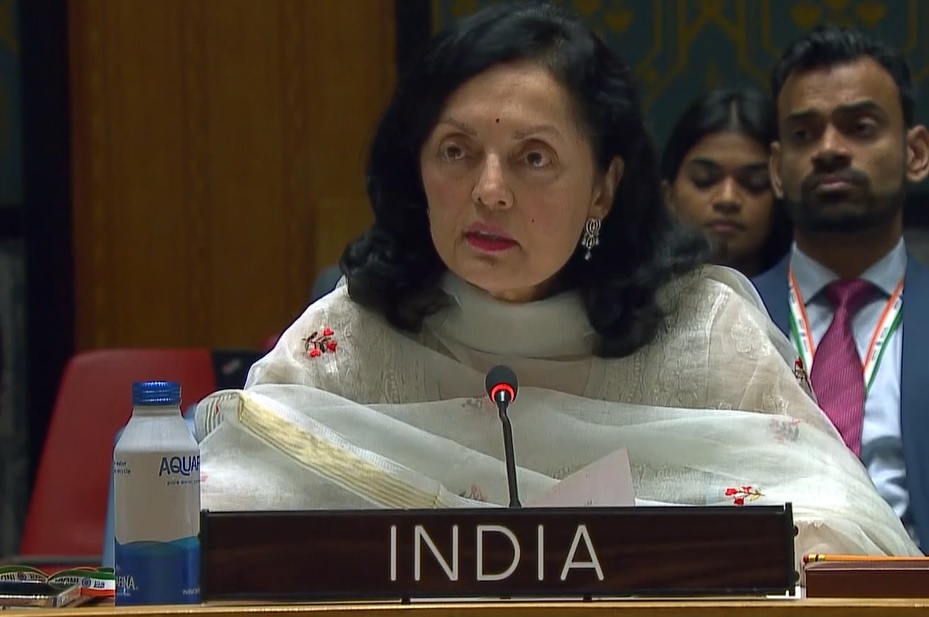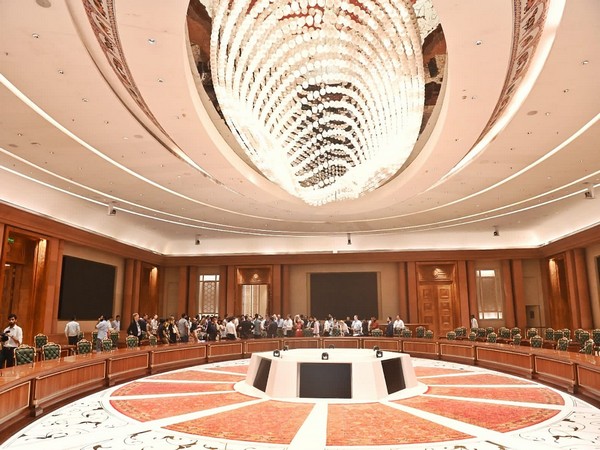Ruchira Kamboj tells UNSC that India has declared its commitment to leverage its G20 presidency to depoliticise global food supplies, reports Arul Louis
To fight the global threats of food shortages and famine, India has declared that it is committed to leveraging its presidency of the G20 to depoliticise global food supplies.
Speaking on Thursday at the Security Council, India’s Permanent Representative to UN Ruchira Kamboj quoted Prime Minister Narendra Modi’s statement that India’s presidency of the G20 is committed “to depoliticising the global supply of food, fertilisers and medical products so that geopolitical tensions do not lead to planetary crisis”.
Leading the G20, India has advocated for greater efforts to accelerate the achievement of the UN’s Sustainable Development Goals, especially the one calling for ‘Zero Hunger’, Kamboj said during the Council meeting presided over US Secretary of State Antony Blinken on famine and conflict-induced global food insecurity.
“As far as India is concerned, we are fully committed to playing our part in addressing contemporary challenges,” she added.
India offered a discreet criticism of Russia for dumping the UN-sponsored agreement that allowed Ukraine to export foodgrains through Black Sea ports.
Without naming Russia, Kamboj said, “Recent developments in this matter have not helped insecurity, the larger cause of peace and stability. India supports the efforts of the UN Secretary-General (Antonio Guterres) in continuing the Black Sea Green Initiative and hopes for early resolution on to the present impasse.”
To meet the global food crisis threat, she said, “We must work together to find common solutions through dialogue and diplomacy” and “choosing peace, cooperation and multilateralism is essential for building our collective future, strengthening the international architecture and governance systems to protect the global order”.
“Addressing the growing food shortages requires us to go beyond current extremes,” she added.
Guided by the ethos of ‘Vasudaiva Kutumbakam’, India sees the world as one interconnected family motivating to help countries in distress, India’s Permanent Representative said.
Even during the Covid pandemic, India worked proactively to strengthen food security by providing thousands of tonne of wheat, rice, pulses and lentils to several countries in the neighbourhood and in Africa, Kamboj added.
With its policy of “Neighbourhood First”, India has provided food aid to Sri Lanka and Afghanistan in recent time, she said.
The representative of the Order of Malta, a Catholic charitable organisation that has permanent observer status and was invited to address the Council, Paul Beresford-Hill, recalled the humanitarian crisis in Bangladesh between 1970 and 1974 when, he said, nearly two million people died due to starvation and malnutrition, and warned that it could be repeated.
A colony of Pakistan in 1970, Bangladesh was hit by a devastating cyclone and it was followed by a violent crackdown by Islamabad’s military on the independence movement from which it took years to recover.
It illustrates “how environmental and man-made factors can combine to have significant repercussions to the civilian population” and the “collapse of the Black Sea initiative raises concerns about the potential for a similar humanitarian disaster, particularly in vulnerable parts of Africa,” he added.
Hunger is rural — three-fourths of the world’s poorest and food insecure live in rural areas. Rural economies, specifically agriculture, have suffered from chronic under-investment. Today, low- and middle-income countries are increasingly indebted, and global inflation and local currency depreciation are making it challenging for them to finance their development and climate action. Additionally, donor support for agriculture has stagnated at 4-6 per cent of total official development assistance (ODA) for at least two decades. After peaking at US$10.8 billion in 2020, it fell 10 per cent to US$9.9 billion in 2021. Estimates suggest that we need US$300-400 billion annually until 2030 to transform food systems. So investment needs to grow at least 30 times!
Small-scale producers still lack access to credit, markets, technology, infrastructure, information and land. This is where multilateral development banks and international financial institutions like the International Fund for Agricultural Development (IFAD) can make a big difference. If we de-risk investments through innovative financial instruments and mechanisms, we can help agriculture become the centre of growth it has the potential to be.
India’s G20 presidency assumes critical importance in mobilising resources that will allow us to deliver on the international community’s resolve to ensure that every person has access to affordable, safe, sufficient and nutritious food. We can do this by increasing digitisation, making insurance attractive for farmers and insurers, providing access to easy and discounted loans, securing land rights and strengthening farmers’ organisations.
India is a crucial partner in the mission to end rural poverty and hunger. Leveraging the panchayat system, India has successfully built robust community institutions that have strengthened people’s ability to manage their own development. These experiences are an inspiration for countries attempting to become food secure. India has shown thoughtful leadership in advancing South-South and triangular cooperation. This has only deepened with its increasing economic weight.
ALSO READ-Lula lashes out at UNSC for not stopping Ukraine war














